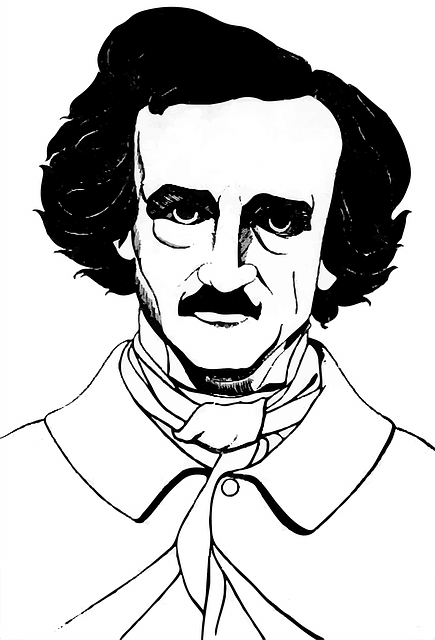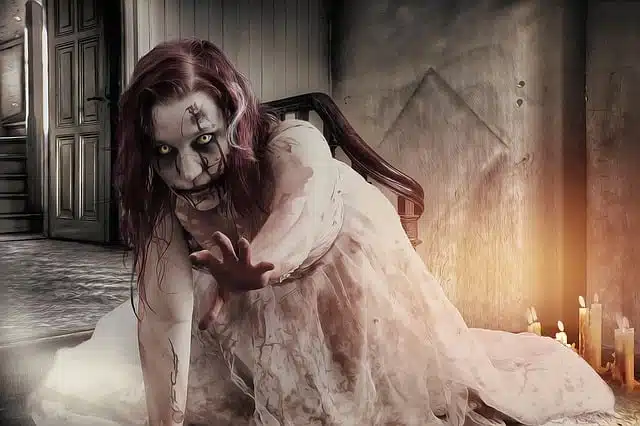
The American Edgar Allan Poe is famous for his horror stories.
Terror is a very intense feeling of fear . Fear is defined as a distressing disturbance of the mood due to a real or imaginary risk; When it overcomes brain controls and the subject cannot think rationally, terror appears.
Terror can cause cold sweats , paralysis of the body and, in the most extreme cases, death from cardiac arrest . The key to mastering fear and terror is self-control . Psychologists recommend trying to breathe slowly and try to clear your mind.
Horror as a genre
On the other hand, horror is a literary and cinematographic genre , which brings together those works that seek to cause fear in the recipient. Thus we find, for example, horror stories written by authors such as Edgar Allan Poe or Stephen King , or horror films such as "Friday the 13th." ( "Friday the 13th" or "Tuesday the 13th" , depending on the country).
As a genre within forms of entertainment, horror usually presents a series of characteristics, depending on the tendency of each author. First of all, the most common characters are usually ghosts, supernatural monsters, and psychopaths ; beings that are difficult to understand, with unpredictable minds and who generally have an insatiable thirst for death and revenge. Not knowing what will happen in the next few seconds, when the killer will jump on his next victim, is an element of suspense, which is closely related to terror.

Monsters, ghosts and zombies are common characters in horror stories.
Other type of resource
On the other hand, there is an opposite resource, which can be equally effective: giving the viewer, reader or player (depending on the format of the story) absolute and constant knowledge of the enemy 's location and intentions. Citing the phrase "ignorance is the basis of happiness", it is easy to understand the nervousness and anguish of an audience that knows at all times where the murderer is .
Returning to the kinds of characters that usually represent the cause of terror in these stories, there is a clear distinction between a ghost and a tangible being; Regardless of the degree of realism, a specter can appear and disappear, pass through walls, and is expected to generate psychic decompensation in its victims, leading them to suicide or a mental institution. On the contrary, a flesh and blood murderer, whether he comes from this world or a fantastic one, can use other types of weapons that cause physical damage.
Psychological horror and gore
This marks one of the first subdivisions of this very popular genre: psychological horror and gore . The first makes use of fewer special effects or graphic elements, in favor of others that provoke the audience's thinking and analysis, or that generate discomfort and insecurity; They affect your mind in a non-direct way. The second, coming from an English term, is characterized by the presence of extreme violence, blood, attacks with daggers and axes, which leave their victims disfigured.
There are also hybrids of both trends, as well as products from one subgenre or another that make use of predictable and ineffective elements. As with all arts, the secret to a work's success is not what it presents to its audience, but how it does it.
Expert word
Nicolás Maggi is a journalist, twitterer and podcaster. Author of "The Second Death of the Punk God" and "Turbio" , his paranormal stories are followed with interest by thousands of people through different platforms.
– What do you think is the reason for the collective interest in horror stories?
I think it's a way that society processes fear of the unknown. It is a very particular moment in the world, of great hopelessness. There is a growing perception that positivism, scientific thinking, fails to explain some folds of reality, and that is pushing people to approach mystical questions.
Some see this as a throwback to medievality, but it is also a bit the result of a collapse of postmodernity, which has managed to put everything in relative suspension due to the inability to differentiate truth from lies, the parceling of opinions into bubbles that are comfortable for each person and where they do not come up against differences, polarization, and that type of phenomena.
There are no longer monolithic answers to humanity's great questions that can contain people. At the same time, there is a process of great erosion of traditional religions, while others advance that are more prepared to dialogue with this moment due to the speed with which they promise changes (such as evangelicals), and pseudosciences, neomanochantas, speeches that mix coaching with transcendental delusions, and a long list of scammers and spiritual profiteers.
In this framework, the question of the paranormal is more present than ever. And consuming this type of stories is a safe place to deposit your fears, to participate in that simulation of putting yourself in danger that always ends well, because you can take your eyes off the screen and return to your life at any moment. Maybe a little suggestive, but safe and sound, because it happened to someone else.
And also, for those who had an inexplicable experience, it is a way to feel less alone. To approach a kind of digital stove in which you find a peer in the other, where you can build a community, where there is an agreement to believe each other among the members and where that type of violence so common in networks and anonymity does not appear. Something that, in the midst of so much desolation, can be a comfortable refuge.
Nicolas Maggi
– According to your experience, what characteristics and qualities should a narrator have to be able to unsettle the audience through a terrifying story?
In the “Turbio” project there was a stylistic decision that all the stories promise to be real. That is, someone told me about it, claiming that it happened to them. Obviously there is an agreement with the person who tells it to me and with the person who reads it. We all accept that reading contract.
I think that generates some morbidity, as happened to us when we saw "Blair Witch Project", the mother of found footage, under the rumor that it was a real case. We didn't have the internet at that time to find out that it was a mockumentary. And the power that gave it that feeling of seeing something that perhaps really happened, turned a low budget film with almost no special effects into a terrifying and magnetic experience.
To reach these real cases, a system had to be developed. The collection mechanism is as follows. People write to me and tell me they have a testimony. I interview her, always in writing, sometimes by audio. I ask questions, I try to organize the story, I seek to clear up inconsistencies, I use the toolbox of my job as a journalist to compare, weigh, and realize if they are lying to me. At the same time, I try to get under their skin to be able to tell it.
That empathy, I understand, to be able to immerse myself in his psyche, capture his sensations of terror, somehow manages to remove me from the place of narrator when I write the story. I am almost a ghost writer for each of the people who bring their case. I appear in my stylistic marks, my fillers, in the way I count. Because in a way that's what keeps people coming back: they like the style. But I am just a vehicle. Like a medium when a dead person speaks through them.
Nicolas Maggi
A period of the French Revolution
The period of the French Revolution between 1793 and 1794 is known as The Terror , where the revolutionaries carried out strong repression against the opponents. Maximilien Robespierre , one of the revolutionary leaders, assured that the so-called Terror was only swift, severe and inflexible justice. It should be noted that Robespierre himself was executed without trial or trial.
This political conception of terror led to state terrorism , which occurs when those in state power use repressive and unconstitutional methods to impose a dictatorship and have absolute control of society .
